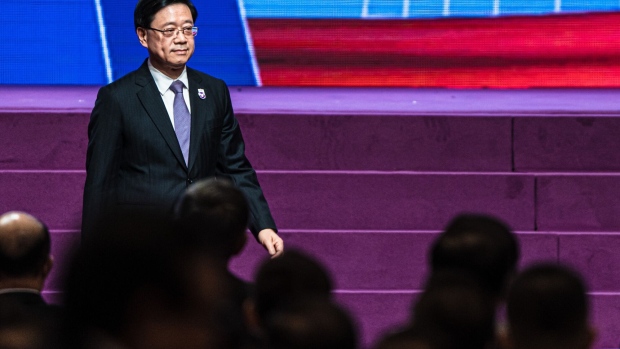Jul 27, 2023
US to Bar Hong Kong Chief Executive From Summit, Wapo Says
, Bloomberg News

(Bloomberg) -- Hong Kong called on Washington to let its leader, John Lee, attend a major economic summit in the US this fall after a report that the Biden administration plans to bar the sanctioned official.
“The US is obliged to fulfill its basic responsibilities as a host to follow the rules and usual practices” of the Asia-Pacific Economic Cooperation bloc, the city said in a statement Friday, adding that would entail inviting it chief executive. “The APEC meeting does not belong to a particular country,” it said.
In an ad-hoc presser Friday evening, Lee also said he expects “the host economy to act in accordance with APEC rules and convention.”
China criticized the potential ban on Lee, with Foreign Ministry spokeswoman Mao Ning saying at a regular press briefing in Beijing that her nation “strongly disapproves.” “We ask the US to correct the wrong move immediately,” she added.
President Xi Jinping is also expected to attend the APEC summit. That could change if the US bars the leader his government installed in Hong Kong, eliminating a key opportunity for Xi to meet President Joe Biden for the first time since November last year in Bali.
The Washington Post reported that Lee, who is under US sanctions for his role in Hong Kong’s crackdown on civil liberties, would be blocked from attending the event in San Francisco in November. The report cited three unidentified US officials familiar with the matter, without providing more details. The US consulate in Hong Kong didn’t immediately responded to a request for comment.
Some individuals who work in Lee’s office were caught unaware by news of the ban, according to a person familiar with the situation who asked not to be identified discussing the private matter.
Blacklisting Lee from the event would exacerbate tensions between Washington and Beijing, already sparring over trade, Taiwan and human rights issues.
The US has imposed a raft of sanctions on China in recent years, and some are becoming a barrier to the high-level dialogue the Biden administration has been pushing to restore. Earlier this year, China rebuffed a US request by Defense Secretary Lloyd Austin to meet with Defense Minister Li Shangfu at a security forum in Singapore they both attended.
Read: Hong Kong Loses Bid to Ban Protest Song in Free Speech Victory
The reason for Beijing’s move was sanctions the Trump administration imposed on Li in 2018 over an arms deal with Russia. Still, top US officials including Secretary of State Antony Blinken, Treasury Secretary Janet Yellen and climate envoy John Kerry have all visited Beijing recently, a sign that two nations have made some progress rebuilding relations.
The US initially indicated it was open to Lee attending APEC but domestic politics — which have seen bipartisan support for tougher China policies — may be playing a role in preventing it from happening. Republican Senator Marco Rubio, a critic of China, said in a letter to Blinken last month that he was “dismayed to learn the Biden administration plans to waive the sanctions.”
Dongshu Liu, assistant professor specializing in Chinese politics at City University of Hong Kong, said the fact the US was barring Lee because of the sanctions “tells you it will firmly maintain its tough policy on China.”
“Although they don’t want their tough policy to become a crisis or a war, but at least currently they won’t give it up,” he said.
Security Law
The State Department earlier this month condemned Hong Kong after it put HK$1 million ($127,650) bounties on eight overseas democracy activists wanted under a Beijing-imposed national security law. At least one of those people joined campaigners in lobbying the US to ban Lee from attending the APEC meeting.
On Friday, the Hong Kong government lost a bid to wipe a controversial protest song from its internet, a rare victory for free speech in the city that could bolster faith in the finance hub’s rule of law.
The move would have directly challenged the freedoms that differentiate the former British colony from the mainland. It would have also raised the legal risks for tech giants from Alphabet Inc. to Apple Inc. and Meta Platforms Inc. that quit the Chinese market years ago due to censorship demands.
Lee was sanctioned by the US in 2020 for “undermining Hong Kong’s autonomy” shortly after Beijing imposed the national security law. That legislation has since been used to jail a large number of the city’s political opposition and pressure the most critical media outlets into shuttering.
See: How China’s National Security Law Changed Hong Kong: QuickTake
While the prohibitions don’t specify restrictions around attending events or meeting with US officials and citizens, they freeze any assets Lee had in the US and prohibit anyone there from providing funds, goods or services to him unless an exemption is issued.
That means any trip to the US could face logistical issues. His predecessor, Carrie Lam, said she had to be paid in cash after being slapped with US sanctions.
Last month, China called on the US to fulfill its “obligation” to allow Lee to visit the summit in San Francisco.
--With assistance from Lucille Liu and Martin Ritchie.
(Updates with Chief Executive John Lee’s comments in the third paragraph)
©2023 Bloomberg L.P.








